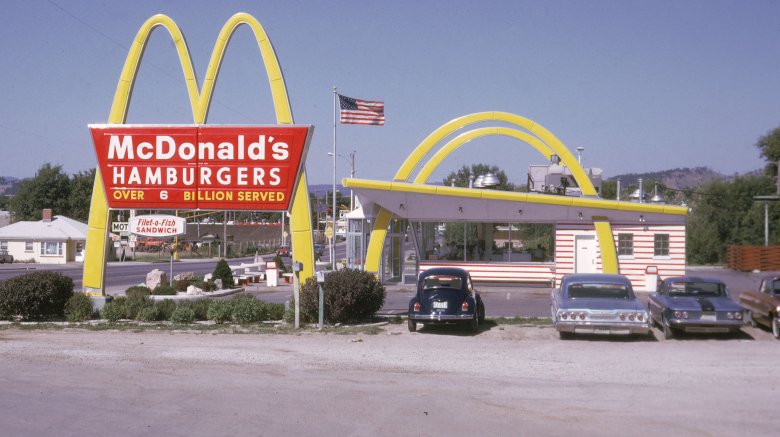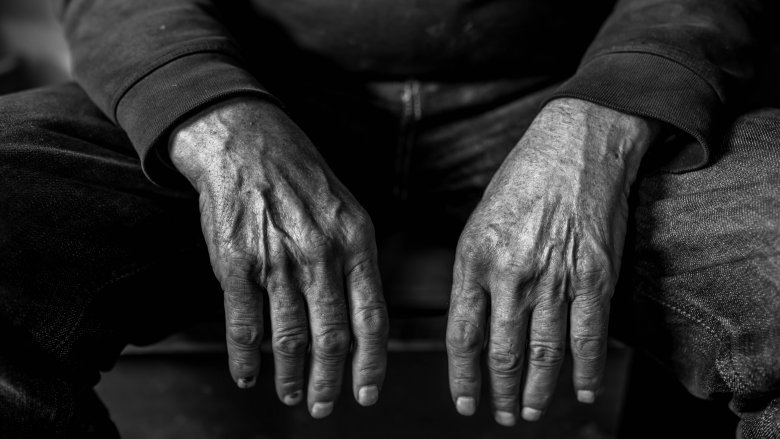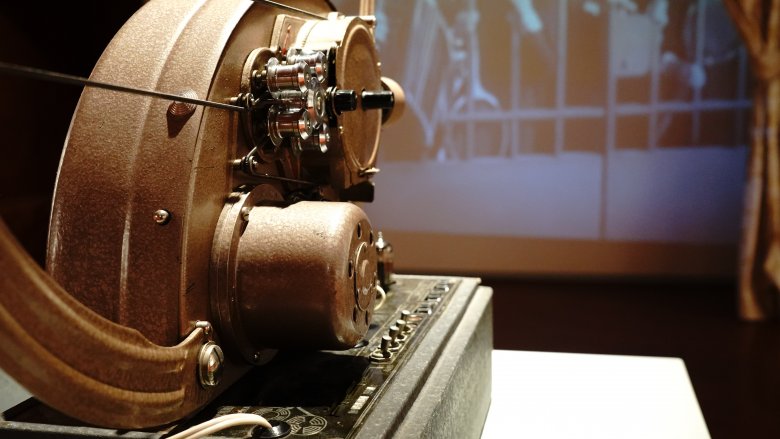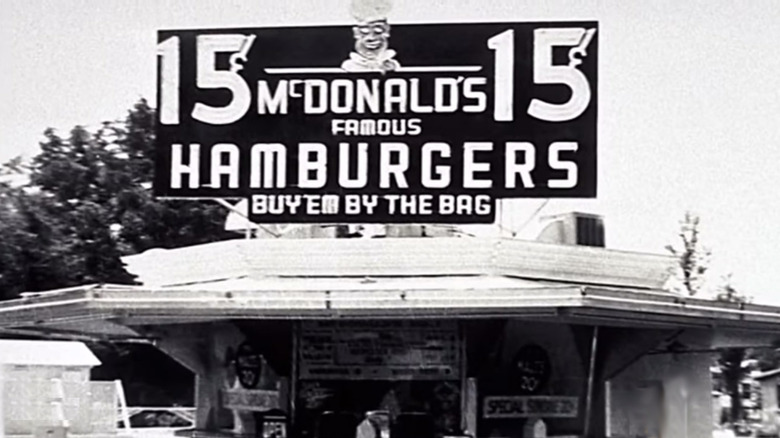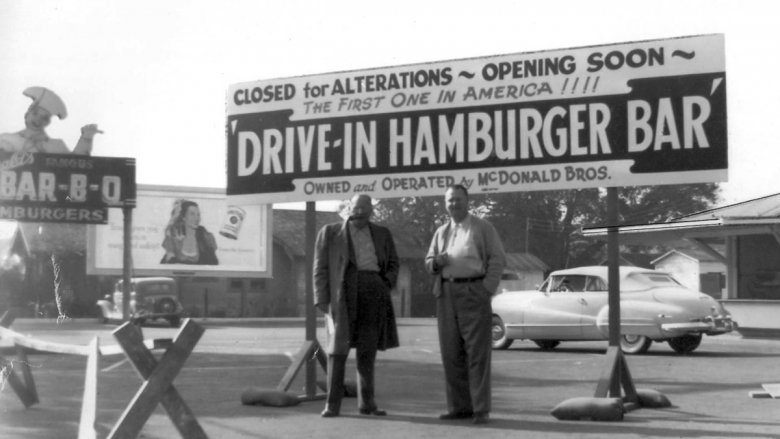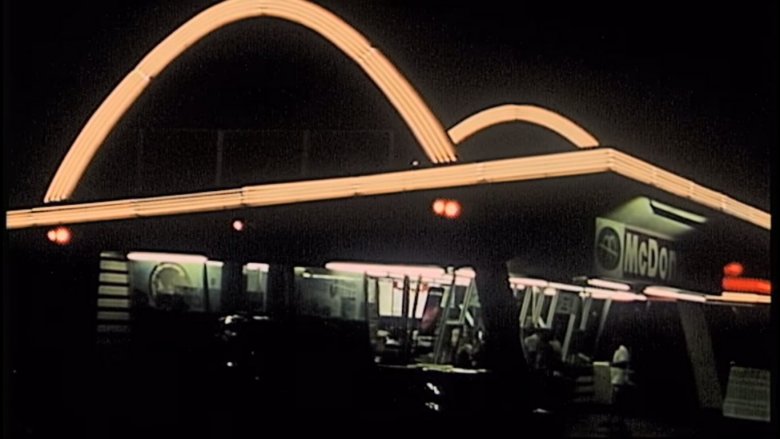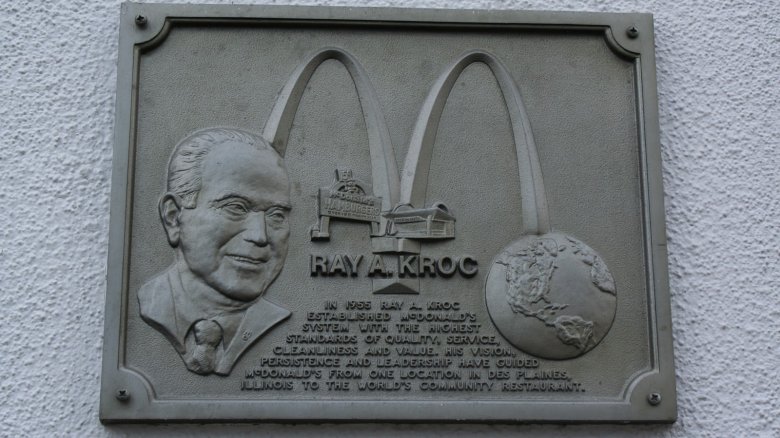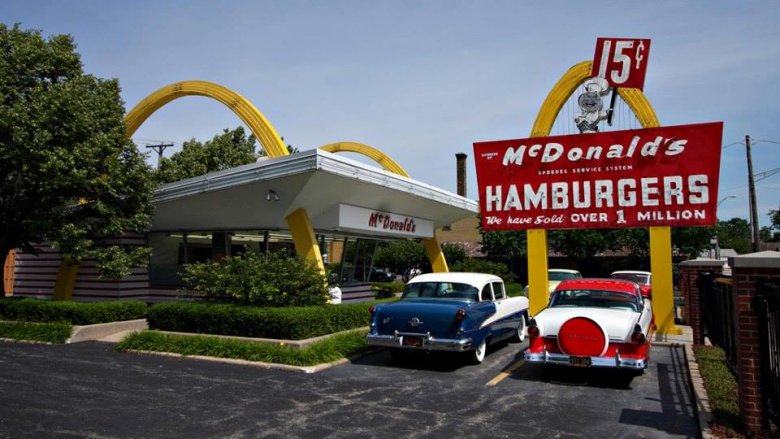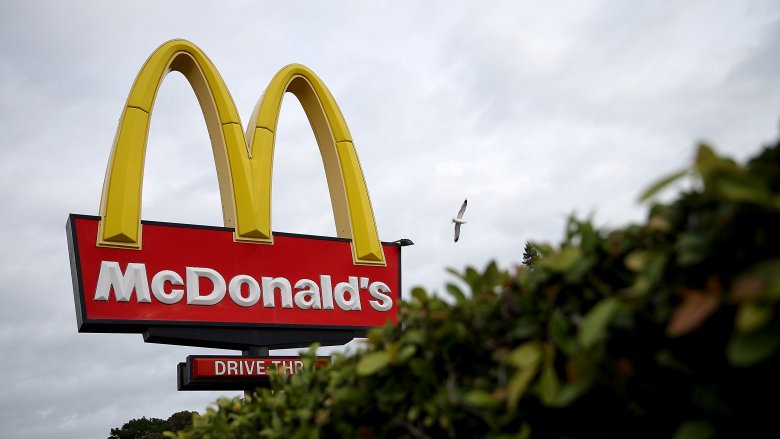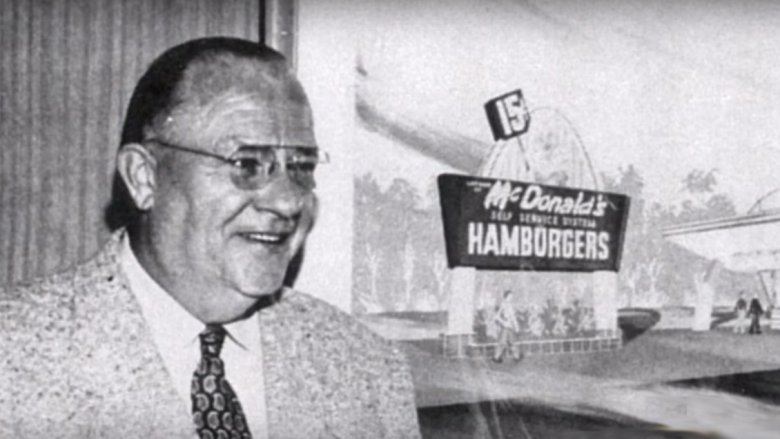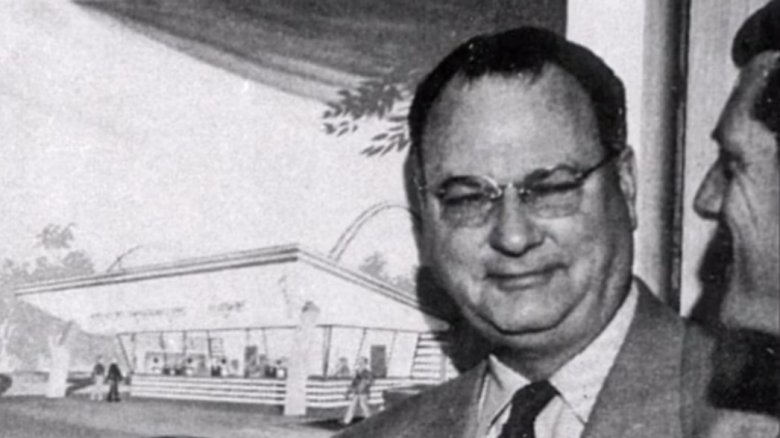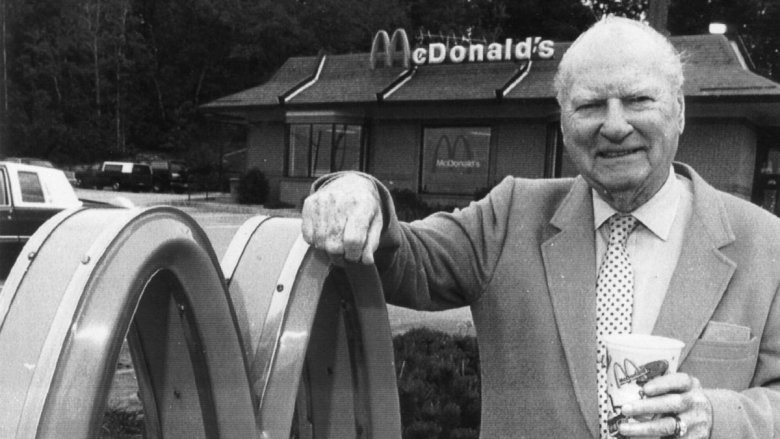The Tragic Real-Life Story Of The McDonald Brothers
If you were to ask the average McDonald's customer who founded the fast food empire, there's a chance they'd guess it was somebody named "McDonald." It's also a very likely possibility that they'd answer "Ray Kroc." While Kroc may have taken McDonald's to such a grand scale that its humble beginnings were nearly forgotten, it was brothers Richard and Maurice McDonald who truly were the fast food restaurant's founders — even though they're not the ones with their likenesses etched into plaques on the restaurant's walls.
While the lives of the McDonald brothers were filled with success that would eventually afford them luxuries like custom Cadillacs, their lives were also fraught with frustration and defeat. The brothers lost out on a fortune and had their legacy all but erased for decades because of going into business with Ray Kroc. "I remember him saying once, when I was a teenager, 'That guy really got me,'" recalled Richard McDonald's grandson Jason French.
This is the tragic story of the McDonald brothers and their fast food phenomenon.
They saw their father struggle
The old adage that greatness is born out of adversity could certainly be true for Richard "Dick" and Maurice McDonald. The brothers were born into a poor family of Irish immigrants in rural New Hampshire in the early 1900s, and saw their father struggle later in life.
Their father Patrick McDonald had worked as a shift manager at the 20,000-employee G.P. Krafts shoe factory in Manchester when he was laid off after 42 years. The elder McDonald had been told that he was simply too old to do the job any longer and the brothers saw their father face down unemployment after decades of hard work.
Learning their father had been cut loose without a pension undoubtedly had an impact on the brothers and they knew staying in their New Hampshire community wouldn't lead to a more prosperous life. "We made up our minds, that one way or another, we'd be financially independent," Dick McDonald once recalled.
The tragic work situation that Dick and Maurice saw their father grapple with however, was the push they needed to west with nothing more than a pair of high school diplomas and ambition to reach for something higher. According to the New England Historical Society, they vowed to be millionaires by age 50 — exactly the opposite of where their dad had been at that age.
Their movie theater flopped
The McDonald brothers didn't set out for California with visions of burgers and fries in their eyes. By all accounts, the burger business only came about after their venture in the entertainment business fizzled out. The brothers had dreams of directing and producing movies, and landed themselves gigs at Columbia Movie Studios doing grunt work on silent film sets for a paycheck of just $25 a week. It was hardly the sort of money that would make them millionaires, and without any more glamorous roles behind the camera on the horizon, they saved what little they could and opened a movie theater.
The brothers bought the 750-seat Mission theater 20 miles outside of Los Angeles, put in a snack bar, and renamed it the Beacon. The 1930 opening of the theater couldn't have been during a worse time, and the brothers were constantly behind on their bills during the Great Depression. Hard times got so desperate that they even buried some silver in their backyard in case the bank foreclosed on the Beacon. After seven years, the McDonald brothers called it quits and sold their movie theater before deciding to try their luck in the food business.
Their reimagined restaurant concept was a major fail at first
McDonald's wasn't simply McDonald's at first — it was McDonald's Barbeque. The food stand that the brothers opened in San Bernardino followed the pattern of other food joints of the era by catering to drivers in their cars. The brothers were even able to reuse uniforms from their failed movie theater for the carhops. Upon realizing that burgers were the top-seller, the brothers scratched their working formula, temporarily closed their doors, and made some drastic changes when they reopened.
The new McDonald's of 1948 had ditched everything that wasn't popular on the old 25 item menu (including the barbecue) and done away with the 20 female carhops. Customers were now expected to get out of their cars and walk to the counter to place their order. People weren't happy about the changes and the once-bustling business came to a halt. Customers would drive-up and leave as soon as they realized a car hop wouldn't be coming over to take their order. Even efforts to stage a busy enterprise by having employees park in front failed to bring in much business.
Had cab drivers and construction workers not slowly started to trickle in after several months, the McDonald brothers would have been failures yet again.
They didn't get much credit for expanding on their own
Time has a way of playing with the facts of history and that couldn't be more true when it comes to the Maurice and Dick McDonald. Both the movie The Founder and general public misconception about Ray Kroc paint the idea that he was the one who had the foresight to expand McDonald's from its original San Bernardino location.
According to Smithsonian Magazine, not long after revamping the operations of their hamburger stand and developing the quick-serve method that would make them famous, the brothers were pulling $100k a year in profits. In 1953, a second McDonald's opened in Phoenix. After that, another popped up in Downey, California. According to The New York Times, by the time Kroc came to the brothers in 1954 to transform their burger joint to the global machine it is today, the brothers already had over 20 locations. (Other estimates put it at six locations.) Unfortunately for the legacy of the McDonald brothers, the truth that they were already had a successful franchise remains mostly ignored, and is even glossed over by McDonald's today.
Ray Kroc ditched the brothers' original arch design
The McDonald's golden arch logo is today a globally-recognized symbol beckoning people to come in for hot fries or a cheap cheeseburger. The double golden arches were not the original design that Dick McDonald had for his restaurant and were only incorporated after the brothers signed over control of their business to Kroc in 1961.
At the time, diners and roadside restaurants were doing whatever they could to stand out among the pack and capitalize on the marketing of highway billboards. Dick hired architect Stanley Meston to design neon-trimmed golden arches that would rise from the sides of the hamburger stand itself. Paired with its Speedee chef mascot, McDonald's had an eye-catching design that worked... up until 1962.
When the brothers sold out to Kroc, one of the first things to go was Speedee chef and after that came a remodeling of the Dick's beloved golden arch. Design consultant Louis Cheskin was hired to reformat the image of each restaurant and believing that they could be used to generate a "Freudian pull for customers," they were doubled into the "M" shape we all know today.
Perhaps even more tragic for Dick's original golden arch design, Cheskin insisted the new logo stood for "mother McDonald's breasts." We're pretty sure that's not what the brothers intended — at all.
Ray Kroc called himself the founder
There's no question that Ray Kroc very much had a monumental impact in making McDonald's the fast food phenomenon that its become. In his eyes, though, the McDonald brothers largely seemed to be insignificant to the history of McDonald's. Probably the most notable example of Kroc attempting to write the McDonald brothers out of McDonald's own history would be his 1970s autobiography, Grinding It Out: The Making of McDonald's. In that book, according to the Sun Journal, Kroc called himself the founder, claiming the birth of McDonald's dates to the first restaurant location under his name in Des Plaines, Illinois.
"Suddenly, after we sold, my golly, he elevated himself to the founder," Dick McDonald said. Prior to that, Kroc had merely been a business partner. ”Up until the time we sold, there was no mention of Kroc being the founder,” McDonald said during 1991 interview with The Wall Street Journal (via The New York Times). ”If we had heard about it, he would be back selling milkshake machines.”
"It was all ego. Why else would you put a bust of yourself in every store? Why would you put your name on the placemats?" says Ronald McDonald, a nephew of the brothers. "Name me one other American corporation where an employee became the founder."
Ray Kroc put the McDonald's brothers' final restaurant out of business
The McDonald brothers' 1961 deal to sell the rights to their growing business to Ray Kroc wasn't without its hiccups. Kroc wanted to own the entire McDonald's chain and borrowed cash from several different sources to meet the brother's $2.7 million asking price. "I needed the McDonald name and those golden arches," he said in a 1973 interview with TIME (via CNN). "What are you going to do with a name like Kroc?"
Kroc wasn't happy, however, that the contract excluded the brother's original San Bernardino restaurant and was furious he'd been cut out of the iconic and very profitable location. "I was so mad I wanted to throw a vase through the window," he recalled. "I hated their guts."
Because the brothers no longer owned their own name, they changed their hamburger stand to "The Big M." Even with the name change, Kroc was still sore over the deal and took revenge by opening a new McDonald's a block away. Within six years, The Big M turned off its grills and the brothers sold the building. "I ran 'em out of business," Kroc would say years later with pride.
The brothers ultimately lost out on millions
Selling a hamburger stand for $2.7 million in 1961 was a pretty killer deal. Except as everyone knows, McDonald's is hardly the typical hamburger stand. Ray Kroc's initial franchising deal with the McDonald brothers looked like this: a franchise fee of $950 with a 1.9% service fee assessed on food sales, 0.5% paid to the McDonald brothers as a royalty, and the remaining 1.4% going to Kroc.
By 1960, Kroc had franchised 228 McDonald's that were pulling in $56 million annually. The McDonald brothers and Kroc had both become wealthy, but Kroc would become filthy rich when he bought them out in 1961 for $2.7 million. The brothers figured that after taxes they'd each have a million bucks. While that certainly wasn't chump change, had they never sold the business, by the end of the 1970s their 0.5% stake would have been paying them $15 million a year.
What's even more tragic — especially for heirs of the McDonald brothers — are the royalties by today's standards. Had the 1961 buyout never happened, a 2012 estimate found that with McDonald's $61 billion in sales, the McDonald brothers royalty fee would be $305 million!
They had already given up control when their hometown got its first McDonald's
The McDonald brothers had big dreams when they left New Hampshire and set off for California in the 1920s. They didn't plan to jump into the restaurant business, but they had lofty goals. The success that the McDonald brothers had found on the West Coast eventually made its way back to New England, but unfortunately, it wasn't under their guidance.
Once Ray Kroc was brought on as the head honcho for opening new franchises, McDonald's spread across the country like wildfire. Kroc's 1956 real estate subsidiary, Franchise Realty Corporation, was the gasoline on the fire that made the rapid growth happen. FRC owned the building, but leased the land and charged rent on both.
FRC had facilitated nearly 600 locations and in 1964, McDonald's number 594 opened in Manchester, New Hampshire — three years after Maurice and Dick had sold the business to Kroc. The real kick in the teeth is that it opened on South Willow Street, just one block from the McDonald brothers' childhood home. When Dick visited the restaurant after returning to New Hampshire, he not only had to stand in line — he had to pay for his meal, too. That had to hurt.
The Founder's Day celebrations weren't for them
The McDonald brothers may have started the business that led to the Big Mac and countless other fast food items, but it took years for them to get any real credit. Sure, they were mentioned in the occasional news article, but at McDonald's headquarters, they were hardly viewed as founders.
An article on Dick by the Associated Press reported that the former restaurateur "braced himself" every year when the chain's annual Founder's Day celebration, meant to honor Kroc, rolled around. It wasn't until seven years after Kroc's 1984 passing that McDonald's corporate finally reexamined their own history and gave Maurice and Dick some recognition.
For the Founder's Day celebration in 1991, TV ads were rolled out proclaiming Maurice and Dick as the founders of McDonald's — though they honored Kroc, as well.
Despite taking 30 years to properly recognize the McDonald brothers, McDonald's senior chairman at the time, Fred Turner said the company never tried to ignore them and passed the blame to the media for giving Kroc all the credit. "This founder business has become an issue," Turner said. "It's embarrassing..." Unfortunately, Maurice had already passed away before any corporate recognition came his way.
They lived modest lives
After their restaurant The Big M was run out of business by a competing McDonald's, the McDonald brothers called it quits in the restaurant business. There was not much of a reason to stay in California any longer, and Dick McDonald eventually moved back to his home state of New Hampshire. ”I never liked California," he confessed in 1985. "I never liked sunshine. We'd get a cloudy day, I'd be happy.”
While Dick would eventually come to accept how things had worked out with Ray Kroc and McDonald's, Maurice passed away in 1971 from heart failure. The brothers' nephew Ronald McDonald said the relationship fallout with Kroc simply wore Maurice down.
"Mac ended up taking it really hard," Ronald said before adding that his uncle Dick once told him he "watched Mac being torn up until the point that he died and I don't want that for myself."
Both brothers did eventually marry and become fathers to stepchildren, but neither had any biological children of their own. The remainder of Dick McDonald's years in New Hampshire were fairly quiet, he lived in a modest three-bedroom home — not the kind you'd expect from a burger baron — and left an estate of $1.8 million at the time of his death in 1998. Of course, that's nothing to sneeze at... but it's also pretty paltry compared to the fortune of over $1 billion that Kroc left behind for his wife.
Dick McDonald wasn't bitter towards Ray Kroc
When you take into account that Dick McDonald and his brother going into business with Ray Kroc led to them losing out on millions — among the other affronts — it would be understandable for him to be bitter. Oddly enough, Dick McDonald wasn't resentful about how things turned out with his fast food business and said he "never" regretted losing out on the fortune that Kroc amassed.
”I would have wound up in some skyscraper somewhere with about four ulcers and eight tax attorneys trying to figure out how to pay all my income tax,” McDonald said. A 1985 profile of him that appeared in the Chicago Tribune described him as an "affable and sweet" man who refused to talk bad about his former business partner — even while a plaque proclaiming Ray Kroc as the founder hung nearby.
What's particularly telling about Dick McDonald's character is the mention in the Tribune piece that after three hours together, the writer didn't hear McDonald utter a single grievance. In fact, when Kroc's name was mentioned, it was with only kind words.
